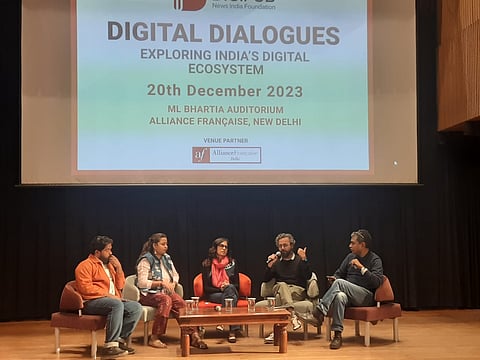
New Delhi - Lok Sabha, on 20th December, passed the controversial Telecommunication Bill 2023 amidst a mass suspension of opposition MPs. Another bill raising concerns is the Broadcasting Regulations Bill 2023, which is under public scrutiny, but chances of revamping it are slim. Due to the problematic aspects of these bills, Digipub, a foundation formed by various Digital Media agencies, organized Digital Dialogues to discuss challenges posed to our privacy, freedom, and information.
The event took place from at ML Bhartia Auditorium, Alliance Française, Delhi, on December 20th and consisted of three sessions with panelists from various fields such as digital media, law, and literature.
The first session, 'Navigating Digital Privacy for Journalists,' invited journalists from digital media to talk about their concerns. Meghnad S, an author and journalist formerly associated with The Newslaundry, commented on a clause in the Telecommunications Bill that gives authorized officers the power to raid and seize equipment. He added, 'For smaller journalists and content creators, their literal bread and butter can be taken away without any notice.'
Meena Kotwal, the visionary founder and Editor-in-Chief of The Mooknayak, expressed apprehensions regarding the vulnerability to targeting. This concern is particularly poignant when an organization is dedicated to addressing issues faced by marginalized communities, potentially unsettling ruling parties.
'Politicians of the ruling parties spread misinformation very frequently, but through this bill, ground-level reporters and journalists like us are being made more susceptible to harassment and increased targeting,' added the founder. Ritu Kapoor, Co-founder of The Quint, asked, 'If there were the IT rules, what was the need for bringing in such legislations?' She continued, 'Now you have the IT Rules, The Data Protection Bill, The Telecommunications Bill, The Broadcast Bill, which are all overlapping. They are extremely broad and vague and lack clarity on what can be seen as punishable. There was once a bargaining power we as journalists held, but that has changed.'
Aslah K, founding editor of Maktoob Media, opened up about the ordeal he and his fellow journalists went through in Kerala after they did a story on the state police. The story of his harassment proves it is not one party but an ideology that is behind the curbing of free speech.
The second session titled 'Telecom Bill - Tech Innovation, Licensing, and Privacy' featured lawyers discussing the legal implications. Apar Gupta, a lawyer, and writer summarized the telecom bill, 'The main concerns that can impact ordinary Indians are the following - surveillance and interception, internet shutdowns, encryption-based services, and the ‘Kartavya Kal’ provisions. These mean you have to agree with all demands of personal data, and if you disagree, there is a hefty fine levied on you.'
Vrinda Bhandari, advocate at the Supreme Court of India working around digital rights, remarked about the breach of privacy, 'We do not want private actors and the government to unnecessarily collect our data. They are effectively killing any choice or consent any user has. They are saying they need data, which is a presumption that all of us are criminals. There is also a cyber risk with all this data being misused, and I am not even talking about that but the very basic concept of consent.'
Shreya Singhal, a prominent lawyer, exclaimed, 'This whole bill is without prejudice to any liability! With this, your whole life is unraveled in front of them to pinpoint you under some crime. Some of the penalties include suspension of the use of telecommunication services, so what, are you supposed to not use a phone? Fundamental rights at every stage are being infringed upon.'
The final session, 'OTT’s Way Ahead: Implication of the Broadcasting Regulation Bill,' discussed possible infringements in the space of digital entertainment.
Anna MM Vetticad, an author, and film critic said, 'When the first draft came across me, I did not understand why it was even needed. The amount of self-censorship happening already is mind-boggling. If an actor is outspoken, they will not be casted.' She then went on to give an example of the movie 'Bheed,' where after the controversy, producer Bhushan Kumar distanced himself from the movie, forcing the director Anubhav Sinha to remove and remake the trailer. He cut the voice-over of PM Narendra Modi giving the speech which announced the lockdown and removed the producer's name. 'Now if you watch the movie, it says ‘Anubhav Sinha’ presents.'
Vibodh Parthasarathi, a communication theorist and a professor at the Centre for Culture, Media & Governance of Jamia Millia Islamia, talked about the models used in other countries and how they cannot be replicated in India. He further pointed out the different aspects of regulations that should have been looked into, instead of curtailing the rights of media persons. 'Balance of power, private ownership, relationship of state and the private players should have been observed. The state missed the point there.'
Alok Prasanna Kumar, Co-Founder and Lead, Vidhi Karnataka, spoke about the political echo chamber. He said, 'Laws do not come out of nowhere. If we take the example of the Amazon series ‘Tandav,’ it was no government initiating the controversy. It was some person who filed an FIR in a random state.'
Also Read-
You can also join our WhatsApp group to get premium and selected news of The Mooknayak on WhatsApp. Click here to join the WhatsApp group.